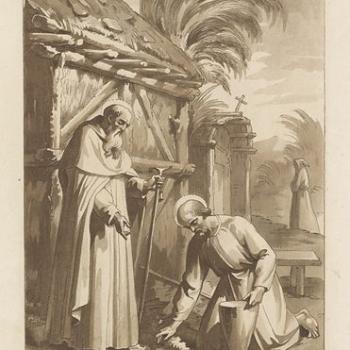Apparently still running (one hopes that Philip's missionary efforts have included daily cardio training!), he asks, "Do you understand what you are reading?" He asks a question that all readers and lovers of the Bible have asked ever since: Do we get it? And the Ethiopian responds, again echoing millions of later Bible readers, "How can I, unless someone guides me?" Of course, the early church, and all subsequent interpreters, developed elaborate means to tease out the possible meanings of the sacred text. But what we are about to hear from Philip offers insight concerning early interpretations from distinctly Christian readers.
The eunuch invites the (exhausted?) Philip to join him in the large chariot to help him with Isaiah 53:7-8, one of the most important passages for early Christians. It is part of Isaiah's fourth so-called Servant Song, describing the mysterious figure who was slaughtered and humiliated and whose life was "taken away from the earth," as Luke gives the text to us. There are several differences in the quotation of these lines from the text that we have from Septuagint (Greek) Isaiah, but one is especially important to note. At the end of Isaiah 53:8, the Hebrew gzr ("cut off") is translated into Greek as airo ("to lift"). This is the only time in the Septuagint that this translation is made, and because that is so, it allows Luke to hear something very different in the text than the Hebrew so clearly states. The Hebrew plainly says that the Servant dies; he is " cut off from the earth." But someone looking for evidence that the Messiah still lives, namely someone like Luke, can read "life lifted from the earth," pointing to a resurrected prophet like Jesus.
So, to the eunuch's question about who this servant is, Philip can readily reply that it is in fact no one else but the resurrected Jesus. And like Jesus before him on that road to Emmaus (Lk. 24), Philip proceeds to speak, "and starting with this scripture, he proclaimed to him the good news about Jesus" (8:35). In joyful response, the eunuch immediately asks Philip to baptize him into this faith of Jesus. And in verse 38, "both of them, Philip and the eunuch, went down into the water, and he (Philip) baptized him." In most translations verse 37 is missing. This is so, because only one family of manuscripts has the verse that demands of the eunuch a confession of faith, something very early demanded of any who would be baptized. The verse seems so clearly to be an addition, made to conform this baptism to the emerging practices of certain communities of Christians, that most translators leave the verse out as not part of the original story. As all can imagine, the verse has caused considerable controversy among those who want things done right and in the right order, too. Like the demons of the Gospels, their number is always legion.
When the two come up out of the water, "the Spirit of the Lord snatched Philip away," but the eunuch hardly noticed apparently, since "he went on his way rejoicing" (8:39). These wild prophetic gyrations should sound familiar. Like Elijah before him, Philip was addressed by an angel (see 2 Kgs. 1:15), carried about by the Spirit (see 1 Kgs. 18:12), and finds himself running down the road after a chariot of a most powerful official (see 1 Kgs. 18:46). Philip now finds himself in "Azotus," a community on the coast on the way to the Roman city of Caesarea, and "as he was passing through the region, he proclaimed the good news to all the towns," which is what a prophet always does (8:40).
This story is not finally the beginning of the Gentile mission; that starts with the grand story of Cornelius that occupies fully six chapters of Luke's book (10-15). This a story about the marginalized brought into the community, a new community that God is forming from every nation, the new community of Jesus. And we, like the prophet Philip, are called to proclaim that new community "to all the towns." The radically inclusive nature of this community is here announced, and will not be denied. When Ethiopian eunuchs are found in our pews as full members of Christ's body, who are we to exclude him or to relegate him to some second-class position?





